Design thinking
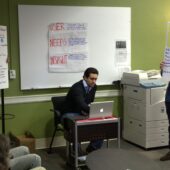 In the quest to build a better mousetrap, the usual approach would include schematics, engineering and experimentation – generally following the scientific method. But if you put on your “design thinking” cap, you might ponder these questions: What attracts mice? Is catching them the solution?
In the quest to build a better mousetrap, the usual approach would include schematics, engineering and experimentation – generally following the scientific method. But if you put on your “design thinking” cap, you might ponder these questions: What attracts mice? Is catching them the solution?
 For most students, a Friday night in December means studying for the next week’s exams, with maybe some social time to celebrate the last week of classes. Instead of getting ready for the library or a party, 16 juniors and seniors spent a recent evening preparing themselves for life after college.
For most students, a Friday night in December means studying for the next week’s exams, with maybe some social time to celebrate the last week of classes. Instead of getting ready for the library or a party, 16 juniors and seniors spent a recent evening preparing themselves for life after college.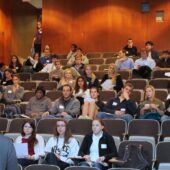 Students in Pat Lord's Bio 367 Virology class helped create a new program designed to develop students' critical thinking skills about bioethics outside the classroom. And it all started with dinner ... and a movie.
Students in Pat Lord's Bio 367 Virology class helped create a new program designed to develop students' critical thinking skills about bioethics outside the classroom. And it all started with dinner ... and a movie.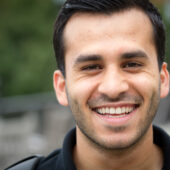 Jawad Wahabzada ('14) finds balancing schoolwork and the global promotion of his documentary "Children of Kabul" a challenge, but says taking courses you love and connecting with a good mentor can make a difference.
Jawad Wahabzada ('14) finds balancing schoolwork and the global promotion of his documentary "Children of Kabul" a challenge, but says taking courses you love and connecting with a good mentor can make a difference.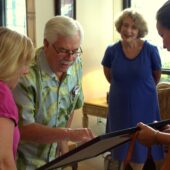 More than 30 of Ray Kuhn's former students, plus their spouses or significant others, gathered in Clemmons last month to celebrate their mentor’s 70th birthday and their shared experiences as his research partners. Kuhn's work as a mentor has grown a close-knit group that spans generations.
More than 30 of Ray Kuhn's former students, plus their spouses or significant others, gathered in Clemmons last month to celebrate their mentor’s 70th birthday and their shared experiences as his research partners. Kuhn's work as a mentor has grown a close-knit group that spans generations.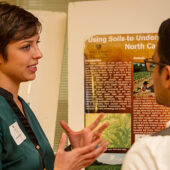 Undergraduate research has been a cornerstone of Wake Forest’s commitment to academic excellence. Now the Undergraduate Research and Creative Activities (URECA) Center provides student grants and administrative support for mentored, undergraduate research and encourages high-quality programs of great impact.
Undergraduate research has been a cornerstone of Wake Forest’s commitment to academic excellence. Now the Undergraduate Research and Creative Activities (URECA) Center provides student grants and administrative support for mentored, undergraduate research and encourages high-quality programs of great impact.
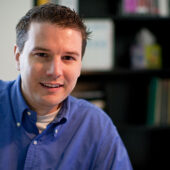 Timo Thonhauser has taken on one of the toughest problems of making hydrogen cars a reality: hydrogen storage. His research is supported by the most prestigious award the National Science Foundation has to offer for young scientists, given to a select few junior faculty nationwide who excel as teacher-scholars.
Timo Thonhauser has taken on one of the toughest problems of making hydrogen cars a reality: hydrogen storage. His research is supported by the most prestigious award the National Science Foundation has to offer for young scientists, given to a select few junior faculty nationwide who excel as teacher-scholars. 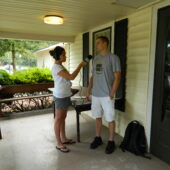 The ring of a wind chime … the chirping of birds … the start of a car’s engine. Noises like these might blend into the background and go unnoticed for many people. But to the 10 children enrolled in 88.5 WFDD’s summer radio camp, these “natural sounds” function as the first building blocks in producing a proper radio segment.
The ring of a wind chime … the chirping of birds … the start of a car’s engine. Noises like these might blend into the background and go unnoticed for many people. But to the 10 children enrolled in 88.5 WFDD’s summer radio camp, these “natural sounds” function as the first building blocks in producing a proper radio segment.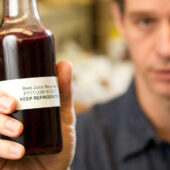 Daniel Kim-Shapiro, physicist and director of Wake Forest’s Translational Science Center, will offer beet juice samples after his talk at the upcoming Technology Briefing, which highlights innovative local companies and institutions. Three others with WFU ties also will present.
Daniel Kim-Shapiro, physicist and director of Wake Forest’s Translational Science Center, will offer beet juice samples after his talk at the upcoming Technology Briefing, which highlights innovative local companies and institutions. Three others with WFU ties also will present. 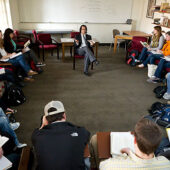 U.S. News and World Report’s 2013 Best Colleges guide ranked Wake Forest 13th among national universities with the best undergraduate teaching. The list highlights “schools where the faculty has an unusually strong commitment to undergraduate teaching.”
U.S. News and World Report’s 2013 Best Colleges guide ranked Wake Forest 13th among national universities with the best undergraduate teaching. The list highlights “schools where the faculty has an unusually strong commitment to undergraduate teaching.”